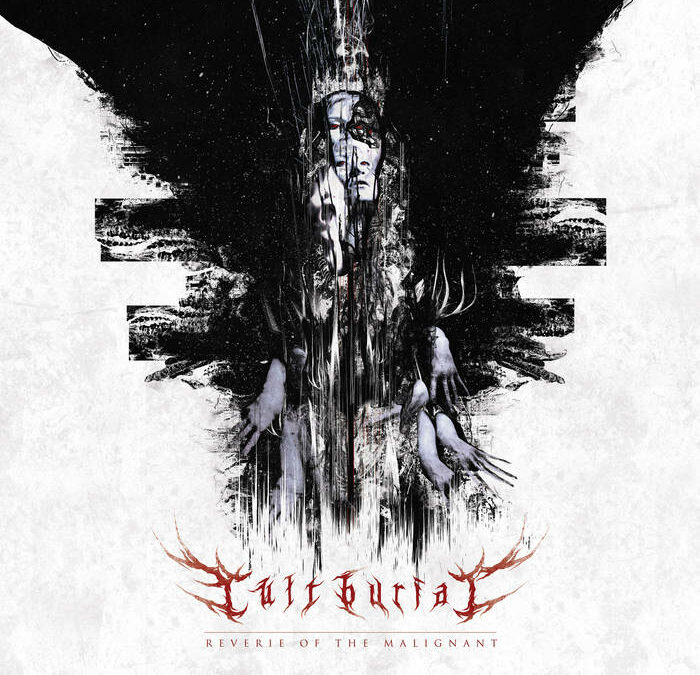Band – Cult Burial
Album – Reverie of the Malignant
Country of Origin – UK
Genre – Blackened Death/Doom
Release Date – October 30, 2023
Label – Independent Release
Author – Mike D’Elia
“What is the difference between death metal and black metal?” Inhaling deeply in preparation for the imminent oration, I pause to consider the necessity of these types of categorizations. While there are distinguishing characteristics, these can be subtle and may be lost on the uninitiated. Any attempts to explain further inevitably get lost in translation.
When a band attempts to blend adjacent styles, the result can be polarizing. An artist runs the risk of alienating an audience that might be too beholden to any particular one of the sounds being blended. Truly, what would distinguish the sound of “blackened death metal” from something like “deathened black metal?” What is the difference between “death/doom” and “cavern death?” What exactly is “blackened death/doom” anyway?
With their upcoming album Reverie of The Malignant, UK blackened death/doom outfit Cult Burial have provided an answer to some of these burning questions, leaving us with much to consider.
From the start of Umbra, the first track on Reverie of the Malignant, a brooding atmosphere becomes apparent as trem picked guitars weave an ethereal atmosphere over a lurching drum groove. This early moment serves to foreshadow many of the moments to come. As the record begins to take shape we are pulled through a tapestry of syncopated grooves, crushing riffs and atmospheric textures that aim to reconcile some of the stylistic variations that comprise the band’s sound.
Cult Burial’s rhythm section does much of the heavy lifting through the record, often toying with off time syncopation in the snare and cymbal work. All the while, the deep rumbling low end of the bass puts a hard stop to any notions of a traditional black metal production style. The mix on this record is heavy–the low end of the bass helps firmly anchor the band’s sound around a modern death metal production framework. At the same time, the bright attack of trem picked guitar leads dance atmospherically behind the punctuated chugs of rhythm guitars that are not shy of toeing into the waters of hardcore territory.
Throughout the record, the midrange low gutturals of vocalist Cesar Moreira’s arresting roar serve as a palpable illustration of the band’s aggression, all the while lending a curious sense of distorted humanity to the record’s crushing instrumentation. Lyrics paint a sense of decay, despair, and catharsis in equal parts, mirroring the ferocity and reflective moments of the record’s instrumentals.
The rhythmic variations in the drumming on Reverie of the Malignant will carry the listener through a shifting corridor of various heavy sounds. Tracks like Paralyzed will draw the listener into hypnotic blackened passages of shuffling blast beats only to suddenly give way to some relentlessly knuckle-dragging downbeat sections. Many of these moments on the album may have the listener delightedly questioning whether this was the same track they were listening to moments ago.
Virtuosic guitar solos punctuate tracks like Awaken, Parasite, and Existence. Meanwhile a more grounded solo is employed on the closing track Oblivion, a song which serves to codify the rest of the album with its broad range of sounds. This final track stood out as one of the strongest on the album, showcasing the aptitude with which the band transitions between heavy styles, touching on many of the stylistic variations that make the album such a captivating listen.
Having reached the end of the record, we must consult our missive once again: what is “blackened death/doom?” What are the differences between death metal and black metal? Who are these questions even truly important to? While subgenres and categories may help us navigate the otherwise impenetrable pantheon of heavy bands who have released music for over half a century, some categorizations are simply better heard than described. In the case of Cult Burial’s Reverie of the Malignant, it is clear that they do not struggle to find a footing within these seemingly disparate styles. They thrive in the liminal space between them.
Biography: Mike D’Elia has given up any hope of a normal life to further embed himself in the world of obscure and experimental heavy music. When not analyzing and writing about other artist’s work, he can even sometimes be found composing works of his own through his moniker Saint Vermin.

